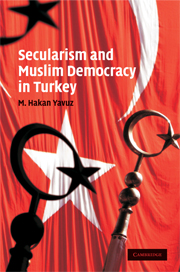Book contents
- Frontmatter
- Contents
- Preface
- Abbreviations
- Map of Turkey
- Introduction: what is an Islamic party? Is the AKP an Islamic party?
- 1 Historical and ideological background
- 2 Political and economic origins of the AKP: opportunity spaces and the backlash of February 28, 1997
- 3 Ideology, leadership and organization
- 4 Kabadayı and mağdur: Erdoğan and Gül
- 5 Modes of secularism
- 6 The Kurdish question and the AKP
- 7 The foreign policy of the AKP
- 8 The political crisis and the 2007 elections
- Conclusion: the end of dual sovereignty and the creole political language
- Bibliography
- Index
- CAMBRIDGE MIDDLE EAST STUDIES 28
8 - The political crisis and the 2007 elections
Published online by Cambridge University Press: 05 June 2012
- Frontmatter
- Contents
- Preface
- Abbreviations
- Map of Turkey
- Introduction: what is an Islamic party? Is the AKP an Islamic party?
- 1 Historical and ideological background
- 2 Political and economic origins of the AKP: opportunity spaces and the backlash of February 28, 1997
- 3 Ideology, leadership and organization
- 4 Kabadayı and mağdur: Erdoğan and Gül
- 5 Modes of secularism
- 6 The Kurdish question and the AKP
- 7 The foreign policy of the AKP
- 8 The political crisis and the 2007 elections
- Conclusion: the end of dual sovereignty and the creole political language
- Bibliography
- Index
- CAMBRIDGE MIDDLE EAST STUDIES 28
Summary
This chapter examines the sociopolitical causes, actors and consequences of the April 2007 political crisis and its impact on the July 2007 national election results in Turkey. The actors in the crisis were the AKP leadership, an assertive secular sector of civil society that organized a series of “republican meetings,” a secularist judiciary, and the guardians of the Kemalist system: the military. Three important causes existed for what can be described as an “elite-centric crisis”: disagreement over the founding principles of the Republic, concerns of the military, and fear of the secular sector of civil society. To understand the causes of the crisis, I will first examine the disagreement between the AKP and the Kemalist sector over the meaning and role of such foundational principles as secularism and nationalism by focusing on the 2007 presidential election. In the second part, I will explore the mobilization of secular civil society in April and May 2007 by examining the demands and identity of the participants. And since the military's e-memorandum of April 27, 2007 considered almost all criticism of the Kemalist version of secularism and nationalism as “hostile voices” of religious fanaticism (irtica) or “separatistist” Kurdish ethno-nationalism, it is important to analyze the role of Kurdish identity claims and the “expansion” of the Gülen movement to understand the military's interference in the presidential election process. The final section of the chapter will analyze the 2007 election results.
- Type
- Chapter
- Information
- Secularism and Muslim Democracy in Turkey , pp. 239 - 266Publisher: Cambridge University PressPrint publication year: 2009



